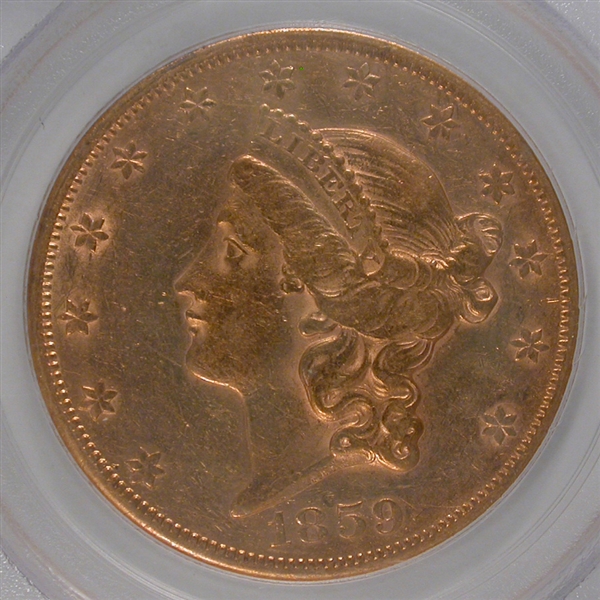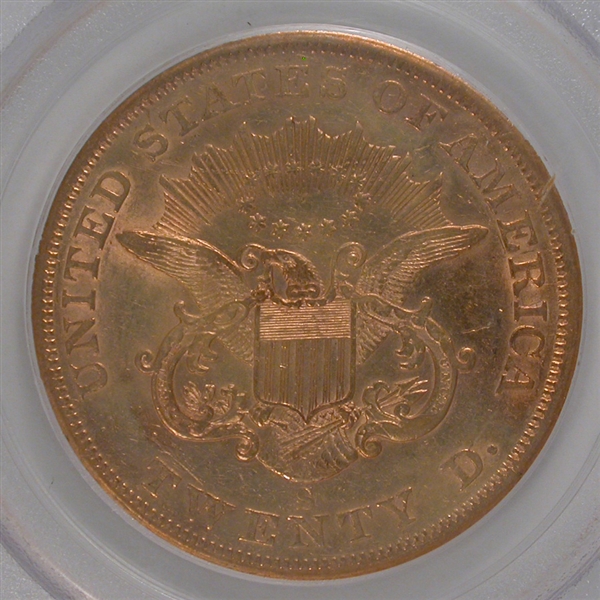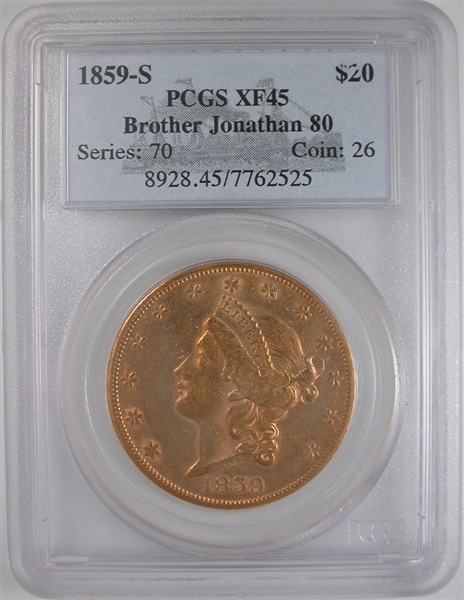1859-S $20 XF45 认证号07762525, PCGS号8928
拥有者评论
Brother Jonathan 80
专家评论
Doug Winter
The following information is from my eBook on Type One Liberty Head Double Eagles at http://doubleeaglebook.com/The 1859-S is similar in overall and high-grade rarity to the 1861-S. It is the most available of the three different double eagles struck during 1859, making it most suitable for a year set of Type One double eagles.
STRIKE: This is a below-average issue in terms of strike. The obverse often shows weakness on the curls around the face and below the ear. Many of the other curls lack definition. The stars, especially those on the left and the final two, are weak with no radial lines showing. On the reverse, there is often weakness on the tail feathers, the eagle’s head, and the wing tips. The obverse edge may show noticeable beveling; this is also present on the reverse but it is not as prominent.
SURFACES: Many 1859-S double eagles are severely abraded. It is actually easier to locate an example with decent surfaces, though, than it is for the 1859-P or the 1859-O.
LUSTER: The luster tends to be frosty with a slightly grainy texture. Some 1859-S double eagles have good luster but on most, the luster is somewhat subdued.
COLORATION: The natural coloration seen on this date is often a rich rose-gold or medium green-gold hue. A decent number are known with original color but these tend to be “dirty” coins from overseas with a “smudgy” appearance which might not appeal to all collectors.
EYE APPEAL: The eye appeal for the 1859-S double eagle tends to be slightly below average. The typical 1859-S grades in the Extremely Fine-40 to About Uncirculated-53 range, and is weakly struck with numerous abrasions in the fields. Higher grade (AU55 to AU58) examples are sometimes available with better surfaces and attractive natural color. The patient collector should find an acceptable 1859-S given some time.
INTERESTING VARIETIES: There are two varieties for this date, one of which is now recognized by both NGC and PCGS.
Repunched Date. The 18 is lightly repunched. This variety is not considered significant but some advanced collectors include one in their set.
Doubled LIBERTY variety. The ERTY in LIBERTY, as well as some other areas on the obverse, show plain doubling. This variety is plainly visible to the naked eye and I think it is very important. It is very rare in Uncirculated (I have seen just two, one in MS60 and one in MS61) and a few in the higher AU grades. Less than 5% of all 1859-S double eagles are this variety.
PROOFS: No proofs were struck.
HOARDS: There were 60 examples found in the S.S. Republic, but only one (an MS61) was Uncirculated. 14 lower grade to middle grade pieces were found in the S.S. Brother Jonathan treasure.
BUYING TIPS: Obviously, a smart tip is to learn how to spot the Doubled LIBERTY variety mentioned above. I have cherrypicked dozens of them, but it is becoming harder now that the surfaces recognize this variety.
AUCTION RECORD: The current auction record for this date is $54,625 which was set by Heritage 1/12: 5036, graded MS63 by PCGS.
FINEST KNOWN: The highest-graded 1859-S is the aforementioned PCGS MS63, but this coin has a detracting brownish vertical toning streak at the obverse center. I have seen a few MS62 examples which I liked more, including a PCGS coin owned by William Crawford, and another PCGS MS62, ex Stack’s Bowers 2014 ANA: 12020 which realized $30,550.
RARITY:
TOTAL KNOWN: 1500-2000+
BY GRADE:
Very Fine: 400-600
Extremely Fine: 700-900
About Uncirculated: 360-450
Uncirculated: 40-50
POPULATION FIGURES: As of the beginning of 2015, PCGS had graded five in MS60, 17 in MS61, 14 in MS62, and one in MS63 for a total of 37 coins in Uncirculated. NGC had graded six in MS60, 11 in MS61, and six in MS62 for a total of 23 in Uncirculated. This includes a single MS61 from the S.S. Republic. These figures are inflated by resubmissions, especially in the MS61 to MS62 range. CAC has approved two MS60 examples, and a single MS62.
PERFORMANCE SINCE 2002: In the current market, a choice About Uncirculated example of this date (equivalent to an AU55) would sell in the $3,500-4,500 range. In 2002, the same coin would have sold for $1,750-2,000. In the current market, an average quality Uncirculated example of this date (equivalent to MS61) would sell in the $18,500-22,500 range. In 2002, the same coin would have sold for $5,500-6,500.
COMMENTS: The overall and high-grade rarity numbers for the 1859-S have stayed reasonably consistent since the first edition of this book was published in 2002. There are a few more Uncirculated pieces accounted for (maybe a dozen at most) but these tend to be low-end, abraded MS60 to MS61 coins that may have actually “gradeflated” from earlier AU55 or AU58 holders. The 1859-S remains very rare in properly graded MS62, and it appears to be unique in certified MS63 at this time.
David Akers (1975/88)
The 1859-S is roughly comparable in overall rarity to the 1855-S, 1856-S, 1858-S and 1863-S but it is more rare than the other four with respect to condition. (PCGS CoinFacts editor's note: Remember this was written in 1982, well before the SS Central America treasure recovery which included several thousand 1854-S, 1855-S, 1856-S and 1857-S Double Eagles.) That is, it is more difficult to obtain than the others in high grade, particularly full mint state. Most known examples grade VF or EF and AU specimens are very scarce. In uncirculated condition, the 1859-S is rare.PCGS #
8928
设计师
James Barton Longacre
边缘
Reeded
直径
34.00 毫米
重量
33.40 克
铸币数量
636445
金属成分
90% Gold, 10% Copper
更高评级数量
431
评级较低的钱币数量
171
地区
The United States of America
价格指南
PCGS 数量报告
拍卖 - PCGS 评级的
拍卖 - NGC 评级的
稀有性和存量估计 了解更多
| 所有评级 | 1771 |
| 60或以上 | 46 |
| 65或以上 | 0 |
| 所有评级 | R-4.6 |
| 60或以上 | R-8.5 |
| 65或以上 | R-10.1 |
| 所有评级 | 28 / 44 TIE |
| 60或以上 | 28 / 44 |
| 65或以上 | 1 / 44 |
| 所有评级 | 56 / 148 TIE |
| 60或以上 | 50 / 148 TIE |
| 65或以上 | 1 / 148 |
























